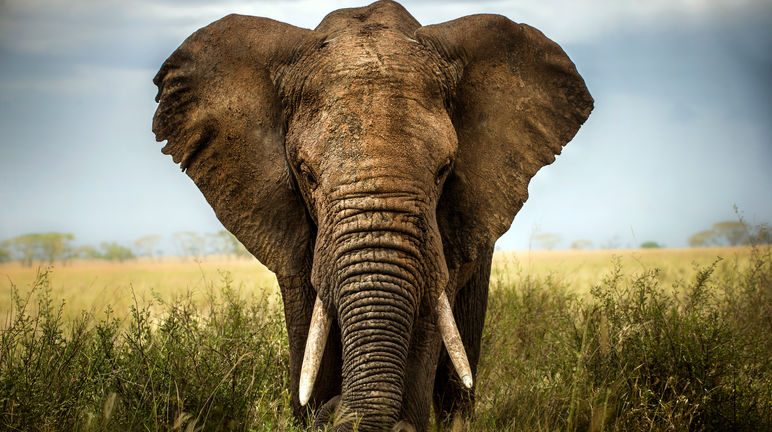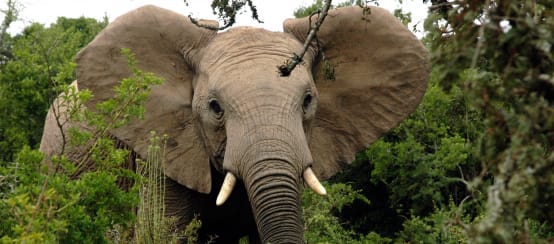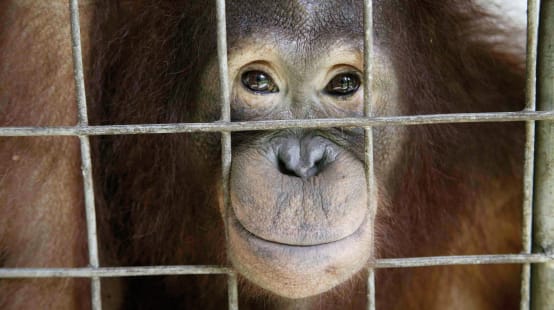Ban the ivory trade – NOW!
 This is what's at stake. (© Istockphoto)
This is what's at stake. (© Istockphoto)
The EU sees itself as a conservation leader, yet it has a blind spot for the ivory business. The trade in “antique” ivory remains legal in the EU – a convenient loophole to launder tons of freshly poached tusks and export them to Asia. Tell the EU to kill the trade – before the trade kills the last elephants!
News and updates Call to actionTo: the European Commission and governments of the Member States
“Ban the ivory trade completely in the EU. Poaching will not stop until the market for ivory has been eradicated.”
Many people assume that elephants are poached in Africa and their ivory is sold to Asia – and that Europe is completely out of the picture. In fact, Europe is a hub for both the legal and illegal trade in ivory.
The sale, the import and export of existing ivory stock is legal in Europe – making it relatively simple for organized criminals to use the trade to launder illegal ivory from poached elephants.
Ivory is openly available for sale in the EU at auctions, in antique shops and online. Some EU companies are even specialized in purchasing and exporting ivory to Asia: more than seven tons of ivory and over 12,000 ivory carvings were exported to Hong Kong alone over the last two years.
No one can say how much illegal ivory is being laundered on the European market, or how many elephants have been killed for it.
In two recent conferences, the international community called on all governments to shut down their domestic ivory markets. The EU has not complied with these demands and continues to undermine the global struggle to save the elephants.
Please call on the EU to ban the ivory trade completely. We need to kill the trade – before the trade kills the last elephants!
BackgroundThe original petition was posted by the German NGO Pro Wildlife. This is the original letter:
I am calling on the Commission and Member States of the European Union to ban all exports and imports of ivory and to close the EU’s domestic ivory market. The international community at the recent CITES conference and at the IUCN World Congress adopted two resolutions, calling on all governments to close their domestic ivory markets. The EU maintains an active ivory market for “pre-convention” ivory, and is the biggest exporter of ivory to China and Hong Kong, with exports of worked ivory experiencing an alarming increase in the last two years. The legal trade enables that ivory from poached elephants is laundered. It fuels demand and corruption. Moreover, EU Member States are clearly being used as transit countries to smuggle illegal ivory from elephants poached in Africa to Asia. Huge shipments have been seized in EU Member States recently and ivory is on top of the list of seized wildlife products in the EU.
As actions are increasingly being taken around the world to close domestic ivory markets and destroy stockpiles of seized and confiscated ivory, I am urging the EU to take responsibility to end its own role in the ivory trade.
Letter to the environment ministers of the EU Member States
Numerous animal welfare and conservation organizations – including Rainforest Rescue – sent this open letter to the environment ministers of the EU Member States.
Dear minister,
We, the undersigned 51 organisations, are writing to request that your government strongly support a closure of all ivory markets in the European Union and the implementation of a ban on all ivory (re-) exports and imports.
Africa’s elephants are in crisis. New status reports released in September show that across Africa, both forest and savannah elephant numbers have declined to an all-time low and are continuing to fall. Based on survey results, one third of savannah elephants have been poached for their ivory within the past 8 years.
The continued legal trade in ivory, whether domestic or international, threatens the very existence of African and Asian elephants in the wild. Legal domestic markets enable illegal trade by serving as a cover for trade in illicit ivory, including within the EU. Ivory markets fuel demand and, in turn, poaching. They also drive corruption, undermine the rule of law, and have been linked to terrorist and militia funding.
Elephant poaching and ivory trafficking won’t stop while legal domestic markets for ivory remain open. The international community has recognized this and with support from EU Member States just adopted two important resolutions at the Conference of the Parties to CITES (the Convention on International Trade in Endangered Species) and at the IUCN World Conservation Congress, calling on all governments to close their domestic ivory markets.
Crucially, China, the world’s largest destination for ivory, has committed to close its domestic ivory market and Hong Kong SAR has also promised to take steps to close its domestic ivory market. Failure on the part of the EU to close its own domestic ivory market could undermine these important developments.
Ivory remains on sale in many EU countries in markets, auctions, antique shops and online. Some EU countries maintain small, but active carving operations. EU regulations only permit the sale of antique or so-called pre-Convention ivory that was acquired before elephants were included on the CITES appendices. There is evidence, however, that new, illegal ivory is being laundered into trade using this exemption, that ivory pieces are being treated to look antique, and that forged permits are in circulation. At the same time, EU Member States are clearly being used as transit countries to smuggle illegal ivory from elephants poached in Africa to Asia. This is evidenced by recent large seizures, including 1.2 tons in Germany and more than 600 kg in France this year, both destined for Vietnam.
In addition, the EU continues to be the largest exporter of ivory claimed to be “pre-Convention” to Asia, with ivory ending up in the same markets and with the same dealers that are selling poached ivory. Data from the Hong Kong Government shows that a total of 7.3 tons was imported mostly from EU countries in 2014 and 2015. Moreover, the number of worked ivory pieces increased by a dramatic 685% from 1,572 pieces in 2014 to 10,761 pieces in 2015. We are deeply concerned that such exports of raw and worked ivory from the EU counteract efforts to reduce trafficking and demand, and are providing a route through which poached ivory is laundered, thus fuelling illegal trade.
Based on the Commission’s Action Plan against Wildlife Trafficking, the Council of the European Union - on 21 June this year - urged Member States not to issue export or re-export documents for raw pre-Convention ivory from elephants on the basis of EU guidelines. The Council also urged Member States to consider further measures to put a halt to commercial trade in elephant ivory. To exclusively end the export of raw ivory however, will be wholly inadequate. The EU urgently needs to implement a comprehensive, legally binding ban on all ivory exports and domestic sales. This would be in line with the recent IUCN motion and CITES resolution.
As actions are increasingly being taken around the world to close domestic ivory markets and destroy stockpiles of seized and confiscated ivory, the world now looks to the EU to take responsibility to end its own role in the ivory trade. France has already issued a ban on domestic sales and exports and the Netherlands has recently declared its intention to do the same. While the EU has been a leader in supporting efforts to crack down on the illegal ivory trade and reduce demand for ivory in other important consumer or transit countries, it is clearly lagging behind when it comes to closing its own domestic ivory market and banning exports.
We urge your government and the EU as a whole to now show leadership by closing down domestic ivory trade as well as banning all exports.
Your strong stance on this issue is essential to halt the decline in elephants, and to reverse the current trend towards extinction. We look forward to your reply.
To: the European Commission and governments of the Member States
Dear Madame Commission President,
Ladies and Gentlemen,
I am calling on the Commission and Member States of the European Union to ban all exports and imports of ivory and to close the EU’s domestic ivory market.
At the recent CITES conference and the IUCN World Congress, the international community adopted two resolutions calling on all governments to close their domestic ivory markets.
The EU maintains an active market for “pre-convention” ivory and is the largest exporter of ivory to China and Hong Kong. The export of carved ivory has increased at an alarming rate over the past two years.
The legal trade serves as a means of laundering illegal ivory from poached elephants, fueling demand and corruption. Moreover, EU countries are clearly being used as transit countries to smuggle illegal ivory from elephants poached in Africa and Asia. Huge shipments have been seized in EU countries recently and ivory is at the top of the list of seized wildlife products in the EU.
As actions are increasingly being taken around the world to close domestic ivory markets and destroy stockpiles of seized and confiscated ivory, I am urging the EU to take responsibility to end its own role in the ivory trade.
Sincerely,














 Recent successes
Recent successes